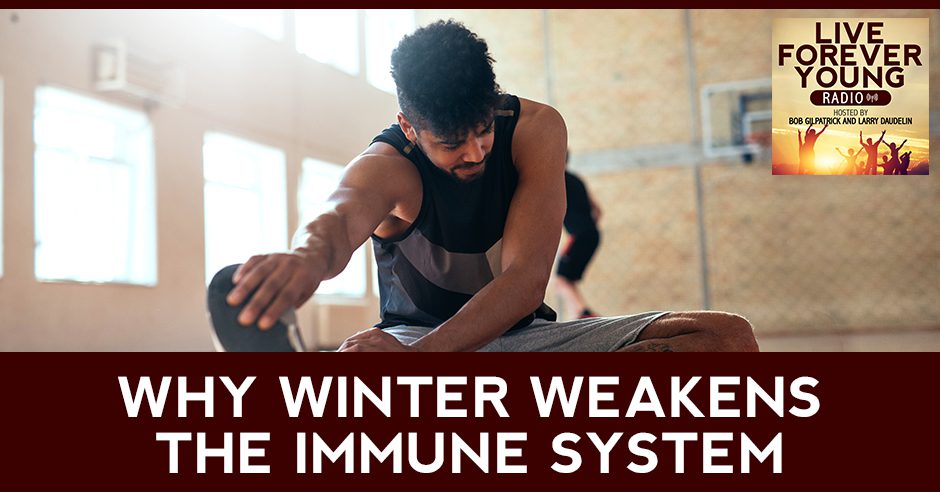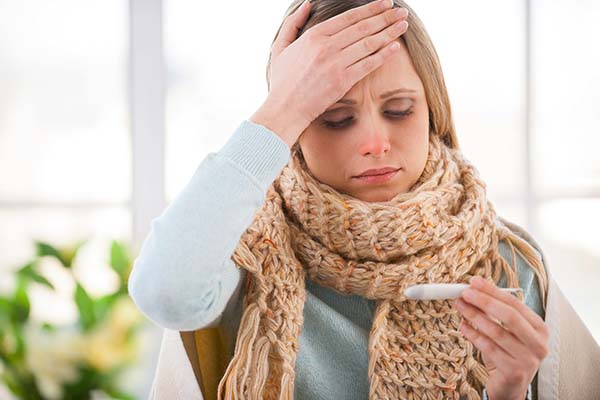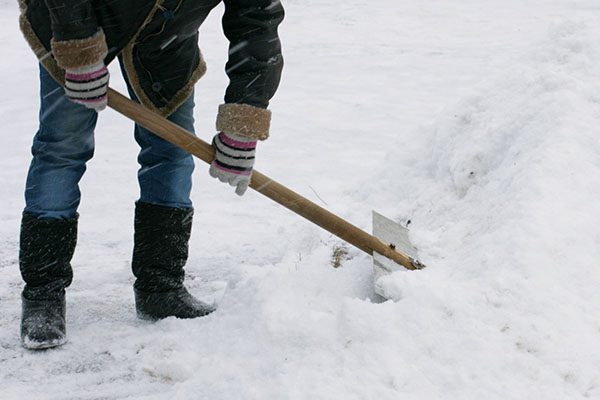Why Winter Weakens the Immune System

The 2022 flu season has been one of the worst since 2010, and it's only November! Today on the show, Bob Gilpatrick and Rollie Culp talk about how the cold in the wintertime can actually weaken your immunity. They go over the physical changes the cold weather has on your body, why it affects your immune system, and how viruses are at their peak during the coldest months. Learn some great tips you can easily add to your daily routine that will make your immune system running on all cylinders. Prepare your body's defenses for one of the worst flu seasons in years!
---
Watch the Podcast Here
Why Winter Weakens The Immune
Tips To Avoid The Flu
The 2022 flu season has been one of the worst since 2010, and it's only November. On the show, Bob and Rollie talk about how the cold in the wintertime can actually weaken your immune system. They go over the physical changes the cold weather has on your body, why it affects your immune system, and how viruses are at their peak during the coldest months of the year. Learn some great tips that you can easily add to your daily routine that will have your immune system running on all cylinders. Sit back, relax, and get ready to live for every young.---
Welcome everybody to the show. I'm here with Rollie. Hello, Rollie.
How's it going, Bob?
Awesome, man. How are you?
I'm excited because I get to wear my jersey. It's getting a little bit colder out.
It is November now that we're doing this episode. It's already flu season. That's what we're going to talk about because usually, flu season ramps up at the beginning of December and goes through February. This 2022, we have a record flu season where over 500,000 people have already gotten the flu starting here in November.
I was watching a little bit of the news. I've talked to some people who've already caught it. They were saying that the hospitalizations from this 2022 flu season are the highest since 2010. 1.5 million people, or maybe more, are estimated to have already had it. With some of the scarier things, 730 of those were fatal, and two of them were children. Children are getting hit real hard by the flu and the bugs this season as well. It's not good.
In the wintertime, as it gets colder in the Northern hemisphere, we tend to see that people's immune systems are weaker because they're out in the sun less, so their vitamin D is lower. We know that having an adequate level of vitamin D is important for your immune system.
It's one of the main things that we talk about. There are also other couple things like vitamin C, which is helpful. Olive leaf extract is very good. They help mainly with the antioxidant properties. When you stay inside, vitamin D comes from the sun. If it's cold, even if it's sunny out, you're not going out there. You're not going to get vitamin D. That's one of the things that happen. You stay inside, you're not getting sunlight, and you end up rubbing elbows with somebody who might be sick and transferring it from one person to the other.
 Wintertime: Vitamin D comes from the sun. If you only stay inside during the wintertime, you cannot acquire it.
Wintertime: Vitamin D comes from the sun. If you only stay inside during the wintertime, you cannot acquire it.
Your body's immune response tends to be lower in the wintertime, also. You have all these protective barriers, particularly your nasal passage, which has mucus, which is a protective barrier. It doesn't work as well in cold weather.
That's why when you go out in the cold, and you've been out there for a while, your nose gets hard and crusty. That's all that mucus that's supposed to protect that nasal cavity.
It responds slower, so it gives more of a chance for a pathogen, like a flu virus, to take hold. You have an innate immune system, which is the first line of defense. Your body has many forms of defense. Your nasal passage is one. You produce compounds in your mouth that help fight infections, and your stomach also. If you take something by mouth into your stomach, the acid in your stomach kills most bacteria. You also have your skin, which is a protective barrier. If something like a flu virus makes it past those protective barriers, right away, your immune system reacts. You have some inflammation. The inflammation is actually a good thing in this case because the inflammation is what attracts the cells that come to try to immediately kill the pathogen. This is the first line of defense. It helps keep it from spreading.
"If a flu virus gets past your body's protective barriers, you will have some inflammation. This is actually a good thing as it attracts cells to kill the pathogen immediately. "
The first thing the body responds to is to fight that inflammation. That's pretty cool.
It's also using inflammation like a magnet that draws the killer cells to it that is encapsulating and killing the pathogens. There's also a mechanism that helps create more inflammation, which brings even more help. The initial inflammation is beneficial.
We talk about inflammation all the time as being bad, and that's more chronic inflammation. What we're talking about now is immediate inflammation to fight at the sight of an infection or something like that.
In many cases, people are exposed to the flu. Almost everyone gets exposed to it. Some people are healthy and strong. That first response stops the spread of the virus, and they don't actually get sick, but if your body is compromised, you can end up not being able to mount a strong enough initial response. You then go into a whole different type of immunity, which is the adaptive immune system that has to use a whole different and elaborate chemical mechanism that's very complex in order to begin tagging, replicating, and spreading the anti-pathogenic compounds to try to get rid of a systemic type of infection. That's what happens when people get the full-blown flu. It's gone beyond that first stage and spread, and now you have to kick in your secondary immune response. That is where it's critical that you be in a very healthy state. The same person can get exposed to the same pathogen or bug. One person gets exposed, and another one gets exposed to completely different types of responses.
One of the things we were talking about before we did the show is how the virus itself is like a spy. He's in there looking for your body's weakness. He's like, "This guy's got lung problems. This person's got a heart issue." It attaches to those things as well. That's why there can be two different symptoms or responses from people from the same bug. One person might have an issue with this, and the other might have an issue with that. The two differences make that bug react differently inside. We say bug, but it's the virus or whatever it is that reacts differently. When we're talking about this, a lot of the things we've talked about are how the cold affects the body and why the body can't handle it quite as well.
Another factor that I don't think we mentioned yet is that the colder temperatures are going to help this virus live longer because viruses tend to have a harder time in warmer temperatures. With the colder temperatures, not only is your body a little bit on the down, and it's not able to protect itself as well, but the viruses are stronger and more active. They're running up your nose or whatever. They don't have a problem, and your body's not ready for it. That's another thing.

Wintertime: "Colder temperatures help viruses to live longer. Your body is a bit on a down during the wintertime, making viruses stronger and more active. "
You want to just know that the healthier you are, the better able you are to react. You are going to get exposed to pathogens continuously. There are bacteria floating in the air everywhere we go. Our body is constantly screening it out with our different defense mechanisms. If you're run down, that's when you're likely to get sick. One of the main things is the issue of sleep. If people are tired, they wake up. They've only got four hours of sleep because they couldn't sleep for whatever reason. Their immune system's going to be much weaker. This particularly is the time of year to make this commitment to know all about the best ways to get enough sleep and make a commitment to do it.
A lot of people don't realize that your body does a majority of its repair and recovery during the sleep cycle. If you're not sleeping well, not repairing yourself well, and not healing well, you add a bug or a virus on top of that, and it throws it all out of whack.
"Many people don't realize that the body does the majority of its repair and recovery during sleep cycles. Without proper sleep, you will not heal well."
We have an episode about sleep. People can read it.
It's called Tips for Better Sleep. Check it out.
Learn all the different tips. This is the time. This 2022, I'm finding more than ever that people are worried about getting sick. We hear people talking about wanting to be healthy because they're afraid to get sick this 2022. This is something that you don't want to be extremely fearful of, but you want to use your intuition to say, "If that's how I'm feeling, what am I going to do about it?" We start with sleep, and another one is stress management. We talk about this all the time. There's a lot of stress in the world now. There's a war going on. You got all kinds of crazy things happening that people perceive to be stressful, so it weakens their immune systems.
On top of that, you got the holiday season, where we did a show about going to visit relatives. Sometimes that can get hairy depending on the relationships. We talk about nonviolent communication as a way to help manage that type of stress in one of our shows called How to Use Nonviolent Communication. Check that out because when you get together in a room full of people you haven't seen in over a year, and everybody's got baggage, some stuff might come up. Make sure you know how to communicate well.

Wintertime: During the holiday season, you will get together in a room full of people you haven't seen in over a year. Be sure to learn how to do non-violent communication.
Using the emotional freedom technique is also very helpful. It's a matter of commitment. Everybody can learn the techniques of NVC and tapping. They're available on our show. You can learn them, but you have to make that commitment to do it. If you have a goal to stay healthy this season through February to make it through the flu season, that's good to have a goal, but with any goal, you're never going to reach it if you don't take action. You take this action. You say, "I don't know if I can learn how to do the tapping. That seems a little beyond me." That will sabotage you. You have to recognize, "If I've got a goal, and there's a skill that I need to reach that goal, but now there's a perceived gap. I don't know how to do it, and I'm not sure I can learn how to do it," that's what trips you up. This is where you have to accomplish your goal by flipping that and using the word yet, "I don't know how to do it yet, but I will learn. Even if I have to call Boomers Forever Young for advice if I can't learn it right properly and I'm stuck," that's when you call us, and we'll help you to get on track unstuck. There's no excuse. If you want to learn to manage your stress, our episodes about it are there, and we're here to answer the phone and help you if you get stuck.
We've said this a million times, but I'll say it again. You could take all the great health products in the world, but if your body's under stress, you're not going to feel better. That's something that you have to learn how to manage. Sometimes you can't just take a pill for it. One of the reasons why we started the show is to share stuff that we can't bottle. We're trying to bottle it in this show and share it. If we share it, that's great, but it takes you guys to actually practice it, try it, and introduce it into your daily routines.
"Even if you could take all the great health products in the world, you cannot feel better under stress. You can't just take a pill for it."
As we've done our show, we've done about 63 episodes. I believe this is about our 63rd episode. We always talk about that. It's not easy right to stay on that track, but that's why we're here to help you back on. Everybody needs help, including me. Bob needs help too. That's why we're here. We're here to help you guys. Don't hesitate to reach out. It's BoomerBoost.com. Go there for the podcasts and blogs. It's great stuff. Do we talk about exercise?
Exercise sometimes is harder in the cold months. People don't like to go outside and exercise. This is where you have to have a commitment. You either need to have a way to exercise at home in your house with a stretch band and the like. You also can join a gym. You can also get layers of warm clothing and go outside to enjoy the cold.
Another thing that people can do in this age of technology, you can go right on and do a virtual yoga class. My daughter has a video game for the Nintendo called Ring Fit. It gives you this band that you got to squeeze and pull. You got to run in the game, and you got to do this. There are different ways besides going outside that you can exercise that can actually make it fun and might make you stick with it because you get rewarded. If you're doing a video game, you get rewarded at the end of your run. That's what we always talk about. You got to reward yourself for doing the right thing. That's another way to stay on track. Don't feel bad about rewarding yourself.
Do it with celebration. You want to celebrate with a gesture, celebrate with a treat, but celebrate because what you celebrate, you tend to do more of. Probably in Buffalo, New York, people aren't going to be out doing a lot of exercises. It's going to snow four feet. Be careful of shoveling snow. If you haven't been doing exercise all year, you could give yourself a heart attack.
That's a very good point. A lot of people don't realize how strenuous something like shoveling snow is. Because your body's in a state where it's trying to keep warm from the exterior temperature, it's easy to overheat in a situation. You're layered up and overheated. There are a lot of people when they're shoveling snow, have had some issues. Be careful when you start getting out there, but at the same time, don't hesitate to do it because that's what's going to keep you healthy.

Wintertime: A lot of people need to realize how strenuous shoveling snow is. Because your body is in a state where it is trying to keep itself warm from the exterior temperature, it is easy to overheat.
Rollie, one of the last things is the issue of keeping your inflammation down in general. We talked about the immune response. That's fine. In general, if people have high inflammation, they're at more risk of being sick. Especially if you end up with an infection in your lungs, if your inflammation is high, you're at risk of getting pneumonia or even sepsis. You want to make sure, in general, you have low inflammation by using antioxidants to reduce your inflammation from the norm, which most people on the scale use a CRP of about a 3. You want to try to get yours below 0.5. Below 0.5, you have very low inflammation.
"People with high inflammation are more at risk of being sick. If they have it in their lungs, they will likely get pneumonia or sepsis."
If you get sick, you won't be at as much risk for an inflammatory complication from the flu. We do that with compounds that we know reduce inflammation, like superoxide dismutase, trimethylglycine glutathione, vitamins A, C, and E, and minerals like zinc, selenium, and magnesium. These are all things that reduce your inflammation. We know from our own experience of our many thousands of customers that have sent us their blood work and talked to us their inflammation tends to come down by about a factor of 10. People who use Boomer products have inflammation ten times lower than people who don't. This is a very good strategy. The good news about it is the same products that reduce your inflammation also help you stay healthy by constantly rebuilding your body. If you're being run down and broken down by poor sleep, flu, smoking cigarettes, drinking too much alcohol, and not exercising, to be able to rebuild yourself in the way people rebuild themself is with amino acids and metabolic enzymes, and certain minerals and vitamins that activate many metabolic pathways. We have all of those in the same products that reduce your inflammation. All the compounds for rebuilding yourself are there as well.
The tools are there. You just got to do it. That's one of the things about the flu and disease in general. Like we were saying, it affects everybody differently, and so do supplements as well. Everybody reacts differently to things. One of the best things is when you get something that works, don't forget it. Stick with it. That's one of the things. That's the key. Do them every day. If you don't take supplements every day, they don't work.
Rollie, thanks very much for being here with me. This was just beginning information but actionable things you can use to stay healthy during the wintertime. Thanks, everybody, for reading this episode. We'll see you at the next show.
Important Links
- Tips for Better Sleep – Previous Episode
- How to Use Nonviolent Communication – Previous Episode
- BoomerBoost.com





Leave a comment